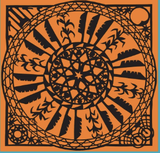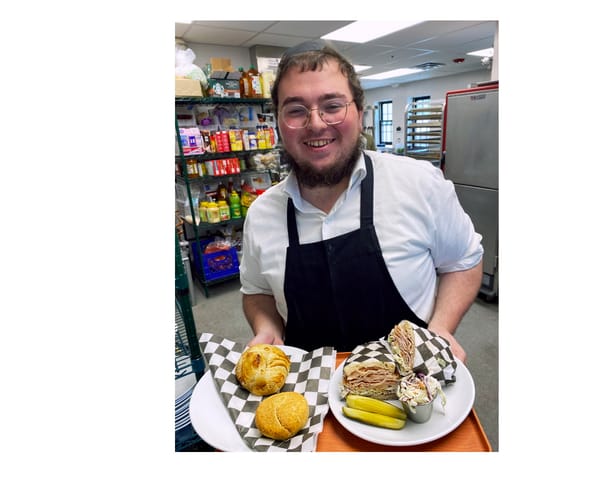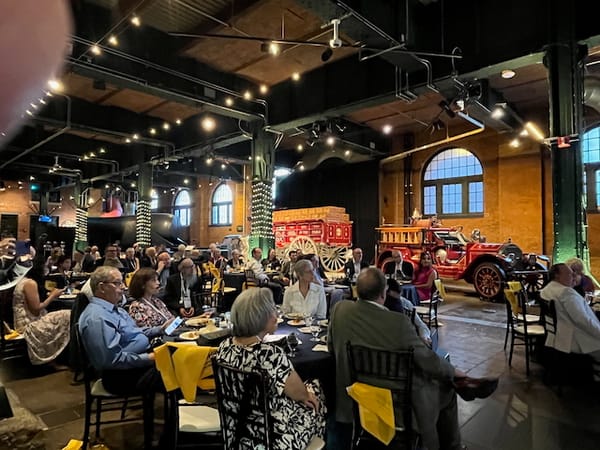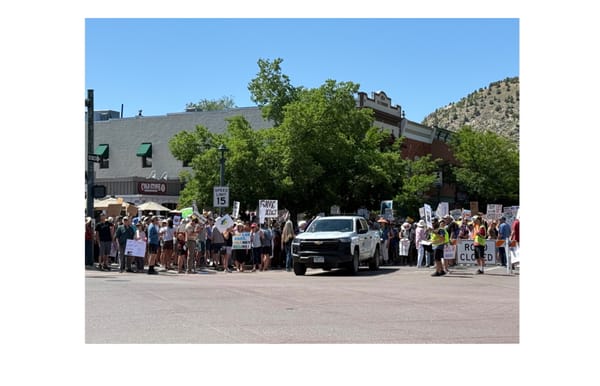Rabbi Neil Amswych, Facing Challenges for Santa Fe’s Jewish Community
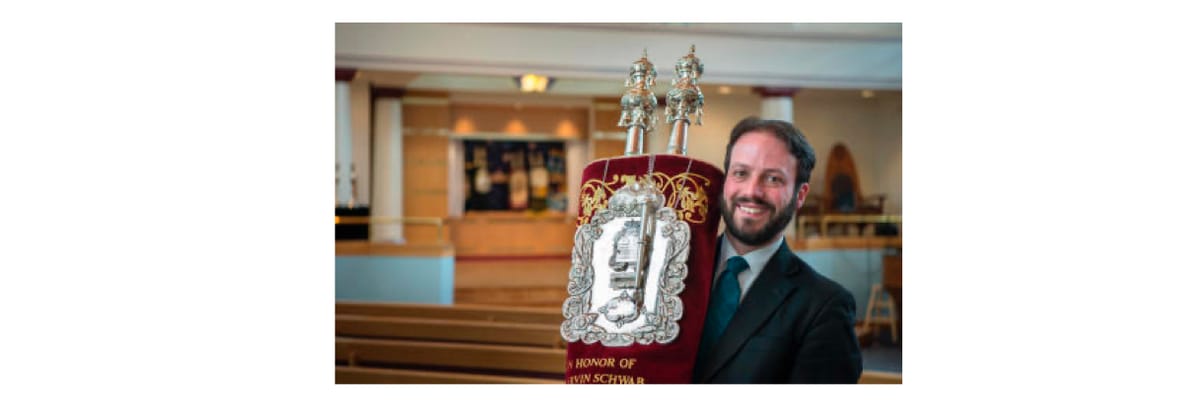
By Brian Serle
New Mexico Jewish Journal recently had the opportunity to ask some important questions of Rabbi Neil Amswych of Temple Beth Shalom. This year, Rabbi Neil marked the milestone of 10 years of service to TBS and to the Santa Fe Jewish community. Our question-and-answer session follows.
NMJJ: Tell us a little about your career before New Mexico. Did you always want to become a rabbi?
Rabbi Neil Amswych: I was the second child in my synagogue to lead the service at their bar mitzvah. During the ceremony, my grandma very loudly shouted “Mun Grrrrandson, ze Rabbi” even though she didn’t have an accent like that. Everyone knew it was going to happen, even then, including me. I went to university to study Astrophysics because it interested me, not because I thought for a moment that I would have a career in it. It was really while I was there that I became certain that I was going to be a Rabbi. I started leading the Jewish community there in my second year, including organizing and creating prayer services at Dundee Synagogue. Other students would go out and get drunk on Friday night and return to our hall of residence upset at what they had done while drunk, and after I lit Shabbat candles and had dinner, I would go and help them through their distress. People would line up for over an hour waiting to talk to “The Ear of New Hall,” as they called me, and I started to wonder if this was something I could do as a career. Added to that, my show business background (and my ego) meant I was comfortable speaking in front of large crowds, and it all rather came together.
Before New Mexico, I was the Rabbi of Bournemouth Reform Synagogue, a very conservative community on England’s south coast. Bournemouth was a much older community – people would call the town “God’s waiting room.” It was the only full-time British Jewish community position available the year I graduated from the Leo Baeck College. I was thrust into a community that was wrestling with whether or not to accept the new siddur which was far more egalitarian than the previous 1977 edition. It was far smaller than TBS – about 350 people instead of 350 families, but shrinking as more and more members passed away. Over time, I realized that my role was really to help hold that community together as it slowly shrank due to demographics, so I moved to Santa Fe to a far more vibrant, progressive and inclusive community.
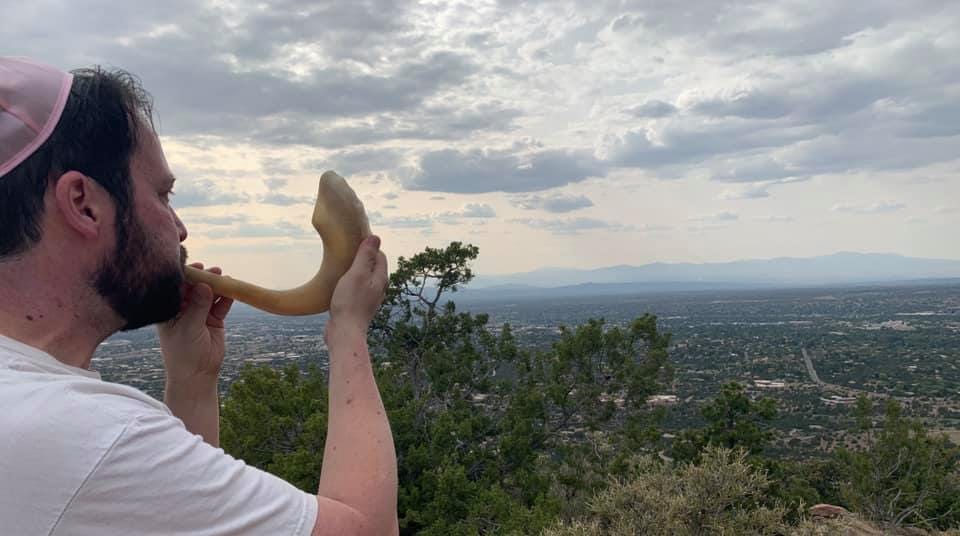
NMJJ: What attracted you to serve the Jewish community of Santa Fe? Are we meeting your expectations?
RNA: There was little interest in connecting Judaism with social justice in my previous community. One member explained to me that he had fought on the beaches at Normandy so we couldn’t ask any more of them. I understood it but it made me restless. Temple Beth Shalom, on the other hand, is passionate about Judaism being relevant in the world, transforming the world, lifting up those who are struggling. It’s prophetic Judaism, and that is where my heart is. The stunning education from a thriving preschool and religious school to exciting adult education programs was also part of it. But at its core, it was family. The moment we walked in for the interview, we were treated like family, and that’s very special. TBS is an extended family, and I think we all need that. I certainly do.
TBS is far surpassing my expectations. Of course, there are challenges in every community, but I’ve been here for ten years now and plan to be here for much longer. I am growing and learning with this community that I’m trying to help to grow and teach, and it’s genuinely my pleasure to be the Rabbi of TBS.
NMJJ: How was your congregation affected by the COVID pandemic, and what is the long-term impact on the congregation?
RNA: I remain very proud of how we responded to the pandemic. Within a week of everything shutting down, we had multiple online study, discussion and spirituality sessions led by a variety of staff. For that summer, we created a program for the kids whose summer plans had been ruined, called It Takes A Village, in which members of TBS offered online sessions from drama to birdwatching to miniatures painting to poetry and much more. Rabbi Jenny created an enormous number of slides so that our services could be online and people could watch me while reading the liturgy. We did everything we could to help people be connected to each other and to the community. For the High Holy Days, we taught members how to write liturgy so that they could contribute to our services differently that year. Some members of the community recorded music so that it could be embedded in the slides that people were watching. We also created the COVID Committee to help advise us, and that eventually became the Reopening Committee as the threat calmed.
The long-term impact is that more people watch services, join us for Torah study, and learn online than ever before. In some sense, that’s a wonderful thing because they’re enjoying Shabbat services from the comfort of their own homes, but it also provides the challenge of the Sanctuary feeling slightly emptier than before.

NMJJ: What are some of the challenges facing the Santa Fe Jewish community, as well as the greater northern New Mexico community?
RNA: The greatest challenge right now is the threat of antisemitism, which is profound. We have seen an explosion of antisemitism in schools across Santa Fe, and I am dealing with it very positively with the public school system and the city itself, including training for all public school staff on how to identify antisemitism, how to understand that it is hate speech, and how to respond. That antisemitism has grown dramatically across the city since Israel responded to the October 7th terror attacks and we work with people across the city to combat it.
For example, conflating all Jews together as holding one view, especially on something as nuanced as the Israel-Hamas War, is a form of antisemitism. I would gently explain to such a person that Jews are individuals who hold widely differing views on Israel, and assuming that I hold one particular view because I am Jewish is not acceptable.

NMJJ: How have your congregation’s education efforts changed over the years? Has October 7 changed that?
RNA: We’re so lucky at TBS to have such good educators who have such differing visions. Brian, as our new Director of Education, you are such a joy and bring such vigor and energy to our education that we’re all really excited to see some of the forthcoming offerings.
October 7th did change the way we talk about Israel and the need to have more spaces to listen to divergent views. We’ve already held some dialogue at TBS, and we’re currently planning much more.
NMJJ: What attracts people to join Temple Beth Shalom?
RNA: It’s different for everyone. For some it’s the sense of close community, for others it’s the spirituality and services, for others it’s the education or events, for others it’s the pastoral support, for others it’s the social justice, and for others it’s even the sermons! There’s no one reason, other than that – and I truly believe this – it’s a very special community.

NMJJ: Rabbi Neil, you have been very active in environmental activism and education. Tell us about your work in this area, especially from a Jewish standpoint.
RNA: Not long after I started at TBS, there was a public consultation about PNM’s latest energy plan, which involved a lot of coal. I went to the meeting to speak against it, saying that the UK – which is half the size of New Mexico and many times rainier has more solar than the entire state of New Mexico – and that was an immoral travesty. It seemed to resonate. Since then, I’ve worked with New Mexico Interfaith Power and Light on some of their campaigns. Much of my work, though, has been on my book. I can’t share too much yet, but it basically calls for a total reevaluation of how Judaism views and thus responds to the world around us.
NMJJ: Rabbi Neil, what makes you happy?
RNA: Family time. My family is my world and time with them is when I’m happiest. When I can’t be with them, painting board game miniatures often makes me happy. And being Rabbi of TBS makes me happy – being around people who care for each other, for the world and for Judaism genuinely makes me happy.
NMJJ: Thank you, Rabbi Neil! Have a Happy and Prosperous New Year!
RNA: Shanah Tovah!
Brian Serle is the new Director of Education at Temple Beth Shalom and contributor to and interviewer for New Mexico Jewish Journal. He and his partner moved here recently from La Crosse, Wisconsin. Brian is a native of New Jersey, Renana is from Skokie, Illinois. Besides enjoying writing articles, Brian likes hiking, biking, photography and leading others in Jewish prayer and song. Renana is a certified gemologist and jewelry designer, so she's right at home in Santa Fe! Brian is the proud grandfather of 7 grandchildren in Chicago and Israel, and has another due on Rosh Hashanah!
All photos are copyrighted. All rights reserved.
Return to HOME or Table of Contents
Community Supporter Advertisers of the NM Jewish Journal:
Jewish Community Foundation of New Mexico
Congregation Albert
Temple Beth Shalom
Jewish Community Center of Greater Albuquerque
The Institute for Tolerance Studies
Shabbat with Friends: Recapturing Together the Joy of Shabbat
Jewish Federation of El Paso and Las Cruces
Congregation B'nai Israel
